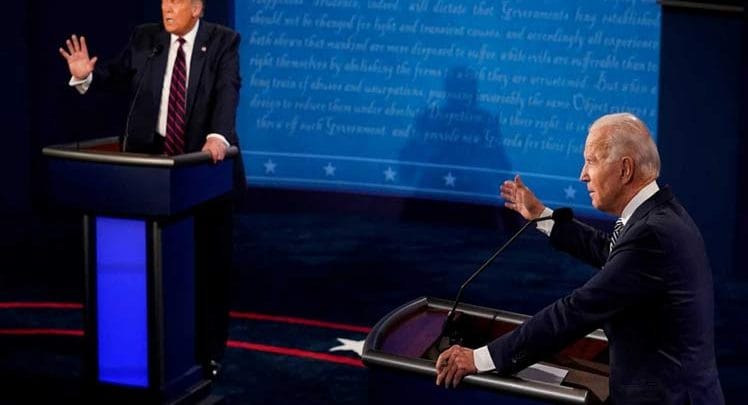
George F. Will: For the sake of the country, cancel the remaining debates
The putrescence of America’s public life was pitilessly displayed Tuesday when, for 98 minutes, whatever remains of the nation’s domestic confidence and international stature shriveled like a brittle autumn leaf. The national interest — actually, national security — demands that the other two scheduled mortifications, fraudulently advertised as presidential debates, should be canceled: When a nation makes itself pathetic, the response of enemy nations is not sympathy. And an additional 180 or so minutes of ignorant assertions mitigated only by the inarticulateness of the purveyors of them will swell the electorate’s already abundant crop of cynics, well defined as people prematurely disappointed about the future.
Most Donald Trump utterances resemble turbid creeks that are silty at their sources and trickle away into mud. He might finish his presidential term without ever speaking a complete sentence — subject, object, predicate. Oliver Wendell Holmes, who characterized Theodore Roosevelt’s Bull Moose movement as one of “strenuous vagueness,” survived Antietam but might have expired straining to decipher Tuesday’s cascade of falsehoods, rudeness and syntactical tangles.
Some viewers, their minds already closed concerning their presidential choice, watched the debate the way some people watch stock-car races: in hopeful expectation of carnage. They were not disappointed. Others watched to decide whether Democratic nominee Joe Biden has the acuity and grit to remain composed while standing next to someone whose indifference to facts dictates his preferred mode of expression — a tantrum. Among the relatively few voters still undecided about their choice, many probably watched hoping for reassurance about Biden, somewhat as voters did about Ronald Reagan in 1980.
Before Reagan’s 1980 debate with President Jimmy Carter, seven days before the election, the polls were much closer than the election would be. Millions of voters did not want to vote for Carter — the Iranian hostage crisis, a “misery index” of 22 percent (the sum of the inflation and unemployment rates in June 1980), etc. — but they would unless they were convinced that Reagan was not the reckless and nasty person portrayed by Carter’s shrill and nasty campaigning. When Carter attacked him concerning health care, Reagan responded with amiable bemusement and triggered a 44-state landslide with four reassuring words: “There you go again.”
Biden was, at most, minimally reassuring. Allowing himself to be sucked into the vortex of Trump’s cyclonic destruction of the event’s negotiated rules, Biden called Trump a clown, a fool and a liar. Truth was, however, an insufficient justification for Biden’s ignoring of this fact about Trump’s behavior: Following him down is an endless journey.
Presidential debates test next to nothing that is germane to the performance of presidential duties. Biden’s ungraceful scrum with someone unhinged and uninformed was an event with no analogue in a well-managed presidency.
Biden’s aging is a decisive consideration in his competition with Trump, whose reelection depends substantially on maintaining his support among the elderly. For the first time in Earth’s history, there are, globally, more people over 65 than under 5. In 2016, more than 1 million more U.S. votes were cast by people over 65 than by those 18 to 34. However, the elderly, the Whitest age cohort and the most receptive to Trump, are a crumbling Republican foundation: In 1993, Florida became the first state in which deaths outnumbered births among Whites; in 2018, that was the case in 26 states.
This is one reason for the GOP’s downward spiral. In the six elections between 1968 and 1988, of which they won five, Republicans won the popular vote by an average of 8.2 million and 9.58 percentage points, and averaged 417 electoral votes. In the election they lost, Gerald Ford in 1976 came closer to defeating Jimmy Carter than Mitt Romney came to defeating Barack Obama in 2012. But in the next six elections (1992-2012), Republicans lost the popular vote by an average of 4.3 million and averaged just 211 electoral votes.
Hillary Clinton’s 2.1 percent margin of victory in the popular vote while losing in 2016 was larger than John Kennedy’s popular-vote margin (0.17 percent) while winning in 1960 and larger than Carter’s (2.07 percent) while winning in 1976. Since 2016, Trump, with malice toward all who were not components of his popular-vote minority, has shown an indifference to arithmetic that his supporters probably consider evidence of his manliness, as they consider his rancorousness.
“Rancor,” wrote José Ortega y Gasset, “is an outpouring of a feeling of inferiority.” A plurality of Americans have concluded that Trump has much to feel inferior about, and Tuesday probably changed neither this nor the nation’s feeling of dread about its accelerating decay.
